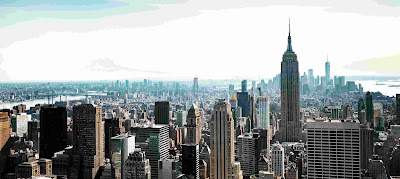 |
| Photo by Dorian Mongel on Unsplash |
Depending on what media outlet you choose, New Yorkers lost or won by kicking Amazon out. The anti-Amazon sentiment seemed misguided to me, though. Yes, they were going to get 3 billion dollars in incentives to build a headquarters there and not have to pay taxes. But if you have 25,000 jobs at $!50,000 a year average, this alone is nearly four billion dollars in taxable income, plus when these Amazon employees spend their money in New York stores and restaurants, all that money is taxed as well. It's not like the Big Apple is getting nothing.
The upshot is that Amazon will now invest their resources in the Crystal City section of Arlington, Virginia. (Or split their investments in two cities, with Nashville being another candidate.)
"If people even bother to compare the skylines, street life and family and neighborhood stability of Long Island City in Queens, NY, and the Crystal City section of Arlington, VA, in the year 2039, they will be appalled by the poverty of the former and the prosperity of the latter."--New York Shoots Itself In The (Amazon) Headquarters, Seeking Alpha
According to a Washington Post story, "Opponents, including freshman Rep. Alexandria Ocasio-Cortez (D-N.Y.), protested that the influx of Amazon employees, to be paid an average salary of at least $150,000 a year, would cause housing costs to skyrocket, drive out low-income residents and worsen congestion on the subway and streets."
OK, this housing cost issue may be real and is the heart of the anti-gentrification movement, but what I want to know is why a solution to this issue can't be found. Why is it an either/or issue? Why can't there be job creation AND low income housing?
"New York City mayor Bill de Blasio and Congresswoman Alexandria Ocasio-Cortez were among those who hounded Amazon out of a development where the average worker was to be receiving a salary of at least $150,000, according to the Washington Post."
Instead of this being a loss of 25,000 jobs for New York, Time Magazine is spinning it as a black eye for Amazon. "It is a clear loss for Amazon and a wake-up call for all tech companies."
What is the wake up call? That tech companies, if they want to grow, should export jobs to China and Japan? "We don't want jobs," hardly seems like a visionary approach to the future.
What's intriguing is how many big cities have forked over a billion dollars to build stadiums for the NFL franchises, none of which will generate even close to 25,000 jobs that average $150,000 a year.
When you read the articles that spin this as a victory for New York, you soon realize that the actual enemy is capitalism. Successful companies should be penalized is the ethos here. On the other hand, logic says that if you have more jobs, then wages will rise as companies compete for good employees, right? If you reduce the number of jobs, then unemployed people will be willing to work for less because a modest income is better than nothing, right?
The comical aspect of all this is that Time's story states that the people of New York do not want this, whereas the Washington Post article stated that 70% of New Yorkers did want this. Unfortunately, a militant vocal minority got in the way.
The deal was already signed in 2018, but before the ink was dry a surge of activist groups got riled and used their animosity to produce a change of heart in the world's largest retailer. The Wall Street Journal explained it like this:
After getting mauled by a mob of unions and politicians, Amazon on Thursday cancelled plans to build a second headquarters in New York City. It’s a testament to New York’s toxic business environment that even $3 billion in subsidies wasn’t enough to keep the company in town.
According to a Bloomberg article, Governor Cuomo "predicted that Amazon would hire 40,000 workers within 25 years and that the city would reap as much as $27.5 billion in tax revenue—a great return on a $3 billion enticement. They had won the game, 'doing what mayors and governors have done for time immemorial, which is to get companies to locate in their region,' says Margaret O’Mara, a professor at the University of Washington who has studied the history of Silicon Valley and other technology hubs."--How Amazon Lost New York, Bloomberg
Stephanie Denning, writing for Forbes, reiterates these estimates, expressing it this way:
"From a purely economic point of view, Amazon was expected to generate $27.5 billion in tax revenue over a 25-year period, 9x the $3 billion government incentives offered. Anyone arguing that $3 billion was an overly excessive offer accidentally chased out $24.5 billion from the city. And that is just the first-order effect." --Why Amazon's Decision To Pull Out Of NYC Is A Loss
The Dems who pulled off the rout will now work overtime to spin it as a positive for New York. Their fans will swallow this line, but the truth will out. Fifteen years from now it will become apparent that Arlington was the beneficiary of New York's foolishness.
Oh the games people play.












No comments:
Post a Comment